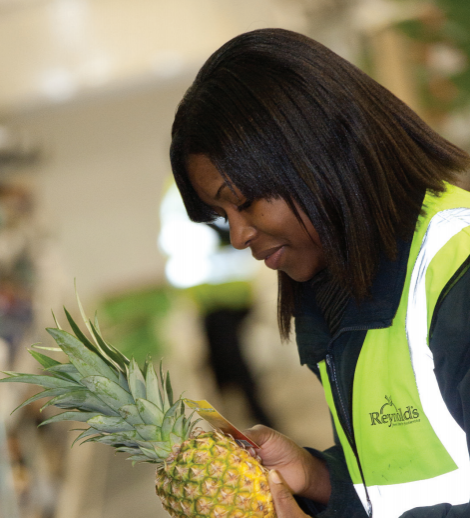Reynolds: “Food safety is the foundation of our business”
The UK foodservice industry is estimated to be worth in the region of £85 billion and although 2016 did not begin so well, the average annual growth is around 2.5% and expected to grow to 3% over the next 3 years said Matthew Jones, Reynolds’ senior buyer, at the international conference ‘Tomatoes, trends towards 2020’ held April 13-15 in Antwerp
The forecasts auger well for Reynolds, a leading distributor to customers including restaurants, catering, schools and healthcare institutions. Consistency of product is very important to its customers, which is why its quality control (QC) team checks every consignment against Reynolds’ own specifications. ”Product consistency is absolutely essential,” Jones said.
Another important focus is food safety. “Food safety is the foundation of this business and critical to our brand,” he said. BRC Food, Assured Food Standards and GLOBALG.A.P. are the standards required of Reynolds’ suppliers to ensure food safety and full traceability. In addition, Reynolds aims for a contracted grower base and long term partnerships with both customers and suppliers, so that all parties involved can grow together. “A stable supply base is a must so we can ensure our customers have a secure robust supply chain and consistent availability,” Jones said.
Flavour, quality and colour increasingly important
As one of the UK’s largest fruit and vegetable suppliers, Reynolds offers a broad range of fresh produce. For tomatoes, the most segmented category, Jones sees a shift in focus from price to other aspects. “In our business, tomatoes are often seen as a commodity and price is still king, but we are seeing a gradual shift towards flavour, quality and colour,” he said.
Education plays an important role in that shift. During customer presentations, Reynolds highlights new products and educates customers regarding the product characteristics, with a clear outlook to the future. “Varietal development is so important for meeting future demand and taste is a critical element.” For the sourcing of tomatoes, Reynolds aims for a long-term contracted supply base.
“These days we are looking for commitment from growers and take a long term perspective,” Jones said.
One aspect of that is the opportunity to work with the growers on varietal development. Some of the research and development activities currently going on include work on mixed heirloom tomatoes, loose cherry tomatoes and on the vine specialties. Often imports are favoured because of their competitive pricing and consistent availability.
On the vine tomato categories growing
Reynolds has a 21-strong product assortment in tomatoes.
“The tomato has got to be fit for purpose,” Jones said. For instance, the tomato used for sandwiches has got to be intense and contain less juice. For salads there is a focus on the smaller cocktail varieties, Datterini and Marzanino, for flavour, and green tomatoes are great for chutneys. Specialities such as Tomatillos Kumatos are also offered in order to allow Reynolds customers to keep up with industry trends.
Some of the current developments Reynolds sees within the tomato category include the increase in demand for on the vine categories. “The smaller tomatoes are being downsized to cocktail size and on the vine to bring the flavour profile back to the consumer,” Jones said.
Regarding the generic round tomato, Reynolds sees the sales morphing from 3 sizes to just 1 middle size. Organic tomatoes are a small category, mainly due to prices, but Jones expects growth in this category in 2-3 years. The plum tomato appears to be quite stable and the beef tomato category is growing due to increased interest in fast food and the growing number of hamburger restaurants.
Customers value heritage
Heritage is playing more of a role in foodservice, since it can offer a point of differentiation for chefs. It is essential to listen to what the customer wants and work with the growers to deliver it,” Jones said.
Aside from the current developments, Reynolds expects major categories such as that of the tomato to evolve even further. Although it is believed that overall tomato consumption is dropping in the UK, Jones does not himself see a decline in volume. However, he thinks the assortment could reduce in SKU’s while volumes are maintained. Moreover, size is an important matter. “Size is very important to us – we try to use the whole range and the whole crop through the sizes, because we can command better prices,” he said.



